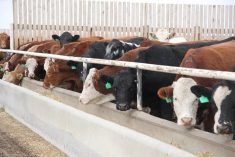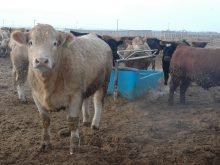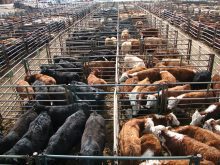This cattle market information is selected from the weekly report from Canfax, a division of the Canadian Cattlemen’s Association. More market information, analysis and statistics are available by becoming a Canfax subscriber by calling 403-275-5110 or at www.canfax.ca.
China news lackluster
Fed steer prices rose slightly last week to average $142.66 per hundredweight, while fed heifer prices dropped by $1.24 to average $141.36.
With China re-opening its border to Canadian beef and pork imports, there was limited impact on the tone of the fed cattle market but packers were willing to pay a premium for ractopamine-free cattle.
Read Also

Critical growing season is ahead for soybeans
What the weather turns out to be in the United States is going to have a significant impact on Canadian producers’ prices
One American packer was active on the Western Canadian cash market and many cattle that traded to the U.S. two weeks ago have been picked up, which helped get some big animals out of the system.
Last week U.S. buying interest was much weaker compared to the previous week and all cattle ended up trading locally.
Dressed sales were reported from $237-$241 per hundredweight delivered. Some cattle that traded last week will be lifted soon but most were being scheduled for the week of Dec. 2 and Dec. 9 delivery.
Alberta fed cash to futures basis levels historically weaken from October to November. Priced against the December live cattle contract, basis levels were reported at -$14.22 compared to -$3.53 per cwt. last year.
Western Canadian steer carcass weights for the week ending Nov. 2 averaged 936 pounds, the largest since April 2016. Seasonally, carcass weights should be nearing a high.
One plant is still not operating in Eastern Canada and this is starting to be felt in Western Canada. Volumes are not large but some fed cattle from Eastern Canada are now being shipped west to Alberta for slaughter.
Last week sales in Ontario were reported from $235-$236 per cwt. delivered to Ontario plants. The region is dealing with some big cattle. Some are being sold through auction barns to move the heavyweights.
Seasonally, there should soon be a leverage shift from the packer to the cattle feeder. Based on the five-year average, from the beginning of November to the beginning of December, fed prices on average increase $4 per cwt.
In the U.S. last week, dressed sales in the north ranged from US$180-$182 per cwt., stead to $2 per cwt. higher than the previous week. Live sales in the north ranged from $115-$116 per cwt.
Steer and heifer carcass weights averaged 906 and 835 lb. respectively, which were seven and 11 lb. heavier than last year.
Non-feds soft
Alberta non-fed prices softened last week on a seasonally large offering. Slaughter cow prices eased $1.25 and $1.50 per cwt. for D2 and D3 cows respectively. D2s averaged $83.90 and D3s averaged $74 per cwt.
Average D2 prices last week were the lowest since February. Dressed co bids slid $3 per cwt. lower, ranging from $157-$162 per cwt. delivered. Butcher bull prices eased modestly lower than the previous week to average $101.06 per cwt.
Western Canadian non-fed slaughter volumes for the week ending Nov. 2 were two percent smaller than the previous week at 7,883 head and year to date were three percent larger, totaling 338,697 head.
Strong trim values continue to be supportive but have been outpaced by seasonally large non-fed offerings. Prices are expected to continue to soften through November.
Strong feeder demand
Alberta feeder prices firmed modestly higher last week with strong demand for light weight calves and for feeders over 800 lb. Large forage stocks have encouraged some producers to retain light calves to background into the new year and effectively limited supplies for others that have feed to utilize.
Light steer calves from 300-400 lb. continued to surge to new annual highs and 400-500 lb. steers are poised to surpass annual highs set back in April. Idle weight 500-600 lb. calves trended fully steady with the previous week.
Reduced kill capacity concerns in Eastern Canada and a backlog of fed cattle in feedlots has slowed Ontario interest.
In Alberta, feeders and 600-800 lb. prices slipped over $2.50 per cwt. lower. Western Cattle Price Insurance Program fed insurance is now available for the last week of May at $162 per cwt. Placed against 900+ lb. yearlings for this May marketing window saw prices firm $1-$2 per cwt. higher.
Auction volumes were over 97,000 head last week and were 14 percent larger than the same week last year. Year to date volumes of 1,291,172 head are five percent lower than last year.
USDA reports Canadian feeder exports to the U.S. for the wee ending Oct. 26 rebounded following Canadian Thanksgiving to 3,104 head.
Beef trade
U.S. cutout values continued to strengthen last week with Choice up $6.11 per cwt. to average $238.29 and Select up $6.53 per cwt. to average $213.02.
Canadian cutout values for the week ending Nov. 2 saw AAA up $4.91 per cwt. to average $281.28 and AA up $3.82 per cwt. to average $255.93.
Despite higher prices, the AAA/Choice spread weakened from -$15 per cwt. to -$22. The AA/Select spread weakened from -$7 per cwt. to -$14 per cwt. due to the larger price increase in the U.S.
















